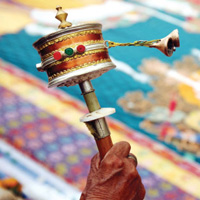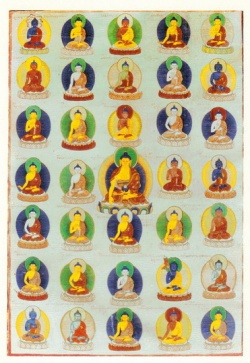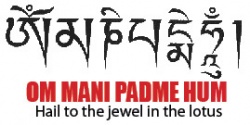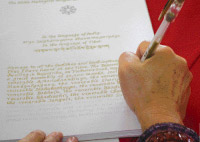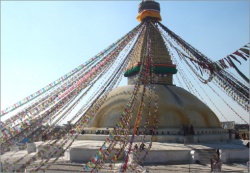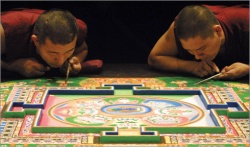18 Ways to Create Good Karma
In Buddhist teaching, the law of karma, explains that 'for every event that occurs, there will follow another event whose existence was caused by the first, and this second event will be pleasant or unpleasant according to whether its cause
was beneficial or harmful, to others and oneself'. A beneficial event is motivated by the thought of benefiting others while craving, resistance or delusions usually motivate a harmful event. Events are not beneficial in themselves, but becomes so by virtue of the mental thoughts that accompany the action.
The law of Karma teaches that responsibility for harmful actions lies with the person who commits them. Karma thus has to do with cause and effect. Every action you take creates the cause for events to happen to you. This means that, every
single thing that happens to you – good and bad - is in truth caused by you, yourself, your own actions and your own thoughts. There is no escape from one’s karma. There are many ways to create good karma. LILLIAN TOO explains 18 easy ways.
1. ACTIONS REPEATEDLY DONE CREATE POWERFUL KARMA
When the same action is repeated many times, be it good or bad, powerful karma gets created. Actions directed at powerful objects such as one’s parents, one’s spiritual teachers or at monks, nuns or temple priests also create powerful karma. This is true of even the smallest disrespectful act or the smallest virtuous action.
The karmic results of actions done to powerful objects can usually be experienced in this life. Suffering results come from negative actions while favorable results arise from virtuous actions. It thus follows that we should really be very mindful of our actions and the thoughts that accompany our actions, because it is from mindfulness that we can develop
habits that lead to actions that create good karma. This is especially important in the present era, a time Hindu masters refer to as the period of the kali yoga when karmic results tend to ripen much faster, usually within this same lifetime.
2. RECITE THE NAMES OF THE 35 BUDDHAS
An incredibly powerful way to purify negative karma is by reciting the names of the 35 Confession Buddhas contained in the Sutra of the Bodhisattvas. As you recite, generate thoughts of huge regret in your mind for whatever
bad things you may have done in past lives, as well as everything bad you did in your present life. When you direct your thoughts this way with genuine regret, you are in effect confessing all the moral downfalls you ever accumulated since life began, many of which you may indeed have forgotten. It does not matter if you recall all the times when you
succumbed to negativities leading to the creation of bad karma. The important thing is simply to generate the mind of surrendering to your inner good nature so it manifests. For this you need the help of the Buddhas so call them, the 35 Buddhas by their
names... generate devotion as you read the names of the Buddhas for they are powerful indeed... better yet put your hands together in the mudra of prayer both palms touching, then think reverent thoughts as you read each name three times. After each name, say the words, I bow to you or I take refuge in you. Here are the names of the 35 Buddhas.
Recite the names three rounds and when you come to the end, make strong dedication. Remember that the merit created by this simple practice is as vast as the skies and as deep as the oceans. Close your eyes for a few moments and feel all negative karma just falling away from you. This is a very powerful practice for dissolving all the obstacles that bring aggravations and problems into your life. By simply bowing to these cosmic Buddhas of the five families, so much negative karma instantly gets dissolved.
3. CHANT A MANTRA
Chanting mantras is the easiest way of getting started on the road towards opening new horizons for the mind. To start with, it is a very powerful way to purify the negative karmic imprints we all bring into the world with us. Negative imprints linger on in every one’s consciousness, the mind-stream that we carry from one lifetime to the next. Start with the most famous mantra in the world, the mantra of the Compassionate Buddha.
This is a very popular mantra. It is wonderfully uplifting as it is the mantra of the Buddha of Compassion whom the Chinese know as the Goddess Kuan Yin. Reciting one mala of this mantra 108 times a day will awaken hidden yogic abilities within you. This mantra will calm your fears, soothe your concerns, heal your broken
heart and answer all your prayers. Chant this mantra aloud, as you eat, as you bathe, as you make up your face or when you are waiting for someone or for something. You can chant it anytime anywhere. Chant it aloud or silently, inside your head, inside your mind. Asleep. Awake. Let this mantra permeate your being. Do not worry about the pronunciation. What is important is your motivation.
While reciting the mantra try to concentrate on its sound and allow it to penetrate deep within, into your inner consciousness and eventually, into your subconscious mind. Always chant it with the thought of benefiting others. It will not take you long to sense wonderful benefits permeating through your consciousness. In no time at all, you will feel yourself become kinder, more tolerant, and less prone to getting upset.
Many high lamas say that just reciting Om Mani Padme Hum can bring us all to Enlightenment, simple and easy though it is. This mantra is one of the ten most powerful mantras of all time.
4. HELP SOMEONE CROSS THE ROAD
Help someone cross the road today or any day. Immediately upon reading this book, go out into the big world and see if you can find someone in need of your help – like an old lady needing help to cross the road. Take her by the hands and walk with her. This should be a
conscious effort to practicing kindness and then it is full of merit. Let the thought of benefiting the recipient of your efforts be foremost in your mind. The idea is to develop one’s attitudes in such a way that spontaneous kindness becomes a way of life.
When you do something helpful out of impulsive benevolence, it does not involve any hesitation at all – it is simply a part of you. And then creating good karma becomes an on going continuous aspect of your everyday life, a wonderful habit
5. WRITE THE SUTRA IN GOLD INK
Even more powerful in creating good karma is to copy the sutras. Write them onto a special book in gold ink if you can. In Tibetan Buddhist monasteries, monks skilled in writing often spend entire lifetimes carefully copying the sutras
using a gold powder mixed with a special paint ingredient. These sutras are kept wrapped in silk or hung on walls. These sutras are holy texts that inspire devotion. Here are four lines taken from the incredibly powerful Sanghata Sutra Dharma Paryaya. It is said that merely copying any part of this sutra (and better yet the complete Sutra) creates an indescribable amount of merit. Merit is of course good karma. The Blessed One spoke as follows:
"Sons of the lineage, listen to the measure of the mass of merit of one Buddha. It is as follows: To make an analogy, as many drops of water as there are in the great ocean, and particles of dust on the planet, and grains of
sand in the Ganges river, that is equal to the mass of merit of a Bodhisattva abiding on the tenth level. The mass of merit of a Buddha is much greater than that. As for those sentient beings who hear this
Sanghata dharma-paryaya, the mass of merit they will produce is much greater than even that. It is not possible to realize the limit of that mass of merit by counting. Sarvashura, at that time, at that moment, those who are greatly inspired upon hearing these words will produce an immeasurable mass of merit."
If you cannot find gold paint you might want to use ordinary pen written on gold coloured paper.
6. GIVE UP YOUR SEAT
A spontaneous way of practicing the good heart is to give up your seat to someone who obviously needs it more than you. This can be a seat on a bus offered to an older lady, a place in a line given to someone in a hurry or on a plane for a couple inadvertently split up by the bureaucracies of a system gone awry – each deed done spontaneously and without having to think too deeply.
The best kind of good deed is often done in response to some inner voice, which makes the action come out seamlessly almost as if it were second nature. Usually people who perform acts of kindness this way reveal imprints of some past life
spent in doing goodness and collecting good karma. For it is said that good or bad karmic actions will repeat themselves through many rebirths. It seems there is a multiplier effect in creating good karma. This is why it is so beneficial to do virtuous good actions. Better to accumulate good rather than bad karma.
7. GOOD KARMA REQUIRES US TO PURIFY BAD KARMA
We all have good and bad karma in our living consciousness. This is why both good and bad things happen to us through the days and weeks, months and years that make up our lifetime. It is important to appreciate how necessary it is to continually accumulate good karma, while simultaneously reduce our accumulated bad karma. This comes from purifying the bad karma left over from past lives. This determines the events and outcomes of our lives. Buddhist masters point to six powerful ways to purify bad karma.
- reading the sutras
- meditating on emptiness
- reciting powerful mantras
- making holy objects such as statues & images
- making offerings to the spiritual master
- reciting the names of Buddhas
Knowing how to do even one of the six ways listed require you to have the good karma to meet up with a Guru or teacher who can teach you how to. Those who have access to the sutras and mantras for instance, purifying their negative karma and accumulating positive karma becomes easy and accessible. That you are reading this already reflects manifestation of your good karma, for it opens your mind to the possibility of creating more good karma.
8. TWIRL A PRAYER WHEEL
Buddhists have a beautiful tradition of creating and twirling prayer wheels. This is a circular implement that contains tightly rolled sheets of paper containing mantras – holy syllables associated with the compassionate Buddha. Each time you twirl a prayer wheel it is like chanting the number of mantras contained inside the prayer wheel.
This tradition is particularly associated with Tibetan Buddhists and when you visit monasteries, stupas or temples in Tibet you will see many prayer wheels set up in a row at entrances. The act of twirling the prayer wheel has the power to purify many eons of negative karma and to create excellent good karma.
In recent years, followers of Tibetan Buddhist traditions have taken to twirling personal prayer wheels as part of their daily practice. My own precious lama once gave me his hand held prayer wheel – which contained 600 million mantras.
It was an incredibly special gift - the mantras within had been printed on microfilm and hence the huge number of mantras contained in the small wheel. Rinpoche taught me to visualize light beams emanating from the prayer blessing me, and every living being around me.
Since then I have experienced amazing benefits just twirling the prayer wheel as part of my daily meditation practice and have since then sponsored countless table top prayer wheels that contain billions of mantras (printed on microfilm) all over my home and office. This way, my visitors and my staff are continually creating good karma each time they reach out to twirl my prayer wheels.
9. GO ON A PILGRIMAGE
Going on pilgrimage means embarking on a journey to visit the holy places of the world associated with the history of your religious faith. It does not matter if you are Christian, Muslim or Buddhist - these and
other faiths have special destinations associated with their religion – thus for instance the Catholics have Rome where the Pope resides or Lourdes; the Muslims have Mecca and the Buddhists of course have Bodhgaya – the town in India where Buddha Shakyamuni attained enlightenment and many other places.
The holy destinations of the world are where holy beings from some distant past created some special energy that touched the lives of many in a spiritual way and continue to touch many lives long after they have passed on. Energy of this kind is divine and long lasting, as many who have made the journey will tell you. Pilgrimage places
cause us to experience something divine, thereby awakening our spirituality. Pilgrimages open our hearts and minds to the positive energy associated with spiritual realizations. Just bathing ourselves in the holy energy of these places awakens us to the compassionate potential within us.
10. READ A SUTRA
Reading a Sutra is like reading a story. Not only are they filled with great wisdom teachings, they also contain stories of Buddha’s past lives, and stories of Gods, Goddesses, kings, deities and most important, they refer to
past Buddhas. These past Buddhas are referred to as Tathagatas or Blessed Ones gone to bliss by having attained Enlightenment. The Sutras contain the names of many past Buddhas and simply reading and giving voice to these holy names create an amazing amount of merit, which translates into a store of good karma.
In some of the sutras, the Blessed one expounds on the mountain of merit created just listening to a sutra being read, what more then the benefits that would accrue to those who read it themselves.
Most famous of the Sutras is the Heart Sutra, a powerful teaching on the wisdom of Emptiness given by the Buddha himself. Mahayana Buddhist monasteries recite this sutra daily and you can too. Another powerful sutra is the
Diamond Cutter Sutra and reading just four lines of this sutra will immediately cleanse anyone of eons of negative karma and create enough good karma to be saved from being reborn into the hell realms. One eon is said to comprise thousands of years...
11. MAKE KINDNESS YOUR RELIGION
Creating good karma is not about being religious. One need not even be a Buddhist or belong to any religious faith to create good karma. What you do need is to develop a kind attitude towards others. As HH the Dalai Lama repeatedly says, "My religion is kindness". So creating good karma is simply about being kind. Not just for a moment but always, throughout
one’s life, in every aspect ozf our living, in every relationship – in the way we conduct our business, in all our interactions – when you approach everything you do motivated by an attitude of kindness, you are creating a great deal of good karma, the kind that creates the cause for others to be kind to you. It is the surest way of developing a life where aggravations simply dissipate.
12. GIVE WAY WHEN DRIVING
When driving, there are so many opportunities to create good karma. Giving way to someone on the road, slowing down when someone wants to overtake you, curbing the sense of annoyance that arises when someone drives badly or inadvertently knocks you – these and other aggravations associated with driving are wonderful ways to train the mind to respond with a calm smile – even when the right of
way is yours, give way. When you refrain from making your time on the road a battle between you and other drivers, it becomes a far more pleasant ride and every time you give way to someone, you can take great satisfaction in knowing that by just curbing your impatience, you have created good karma.
13. READ A SPIRITUAL BOOK
There is great merit in reading the writings of highly realized people, which is one way of describing those who have deep knowledge of spirituality. It is even better, when the subject of the book has to do with training the mind to develop compassion in tandem with wisdom. Compassion is the deep-seated wish of wanting to benefit others. Increasing
wisdom means enhancing your understanding of the true nature of reality, of existence, understanding terms such as emptiness and dependent arising. Good karma is created when one reads and thinks seriously about these main
principles of the spiritual path. When compassion and wisdom become clearly understood principles of one’s life, that is when good karma gets created. When it reaches a point where they become overriding passions in one’s life, that is when one is said to be living a life of Dharma, and then good karma gets magnified and creating it becomes an everyday practice.
14. PAINT A HOLY OBJECT
There is great merit in painting holy objects of devotion such as Buddha deities. This is when the pursuit of artistic creativity can be so beneficial, in fact so much that according to the high lamas, it can even lead one to enlightenment, especially when one pours out feelings of reverence with every stroke of the brush. The key lies in the mental
exercise that accompanies the drawing of an image or the painting of a picture. When creativity is motivated by thoughts of devotion, good merit arises. Tibetan high lamas speak of the special inspiration that come to artists who devote their lives to painting thangkas –beautifully drawn images of the various Buddha deities. In recent years, Western-born
artists who are followers of the Mahayana Buddhism of Tibet have produced some truly exceptional works inspired by their devotion and often influenced by the special styles associated with Tibetan thangka painting. You too can create immense
merit by painting a holy object. It does not need to be perfect – it only needs to be motivated by thoughts of devotion, or reverence to the holy person(s) or Buddha(s) being drawn. Even children colouring the drawings of Buddhas create much good karma.
15. WRITE HOLY WORDS ON A STONE
It is such good fun to create what are known as mani stones... and these are done by writing the holy mantra om mani padme hum on decorative rocks that are smoothed by having been in water for hundreds of years; the best stones are those found in holy rivers that flow from the Himalayan mountains – rivers such as the Bramaputra or the Ganges rivers. If you find it impossible to get your hands on these stones, then any rounded stone the size of a palm will do.
Write the holy words onto the stone first in black ink and then if you wish, use special glue to gold leaf these holy words. The act of doing this is said to bring much good merit. In Katmandu, it is easy to find mani stones written in stylish Tibetan script in the market stalls set up around the holy stupas of this Himalayan city.
16. PRACTICE SPIRITUAL MEDITATION
Years ago when I first met my lama, the incomparable Lama Zopa Rinpoche, I asked him if he would kindly teach me how to meditate. "I am always so stressed out, Rinpoche," I told him, "and I need to meditate to relax and cool down my busy mind".
Rinpoche gave me a gentle smile and replied, "Meditation is very good, Lillian, a wonderful practice … it is not just for relaxing the mind, it has a much higher purpose". What is this higher purpose, I asked and that was when Rinpoche explained to me the benefits of practicing spiritual meditation.
When you sit down on a cushion with your legs crossed, your spine straight and your eyes slightly closed looking three feet in front of you, the first thing to do is to set your motivation. Tune into your mind and focus on why you are doing the meditation – to develop your mind to benefit all beings. Setting this altruistic motivation establishes the basis of
meditation practices. And from then on you can meditate on any subject related to the development of your understanding of life. When you meditate this way lightly reflecting on how precious your life is, how lucky you are to have
been born at all, to be alive and to be well … in time you will come to realize just how lucky you really are in just having a human life, having the ability to think, to analyze, to understand and yes, to philosophize. This is how meditation can lead to wisdom realizations and good karma.
17. CONNECT WITH A SPIRITUAL TEACHER
Start by meditating on your path to ultimate happiness, the kind that is permanent rather than transient. Think through all the things that make you happy and slowly come to the realization that nothing makes us happy forever. All of life
is in the nature of impermanence. The pathway to ultimate happiness is elusive and permanent happiness seems so impossible to attain, since in the end we all grow old and die … so unless we are able to grasp new attitudes and perspectives; new ways of rationalizing our existence, how can we find permanent happiness?
To see the light, we need to connect with a spiritual teacher who has affinity with us and who can open our eyes to a greater awareness of our own Buddha nature, our own spirituality, our own continuing consciousness which lives on from life to life. By generating the desire to meet a special teacher who can show us the way to think and
meditate correctly, we are creating the cause for just such a sage to manifest in our life. The genuine and heartfelt inner expectation of wanting to connect with a higher spiritual being generates the karma for it to manifest. And then when you are ready, the right teacher for you, will come along.
18. SPONSOR A HOLY TEXT
When you sponsor the publication of any holy text you will be doing something that benefits many people indeed. Holy texts contain the wonderful teachings of holy beings and they can be sutras, mantras or commentaries given by holy lamas that have survived through the centuries.
In Mahayana Buddhism there are many incredible teachings that have been carefully preserved and if ever the opportunity comes your way to help finance their translation or their printing do grab the opportunity to do so, because the good karmic merit created is simply amazing. You will find that doing something like this creates the cause for you to benefit enormously from spiritual advice that find its way to you.
